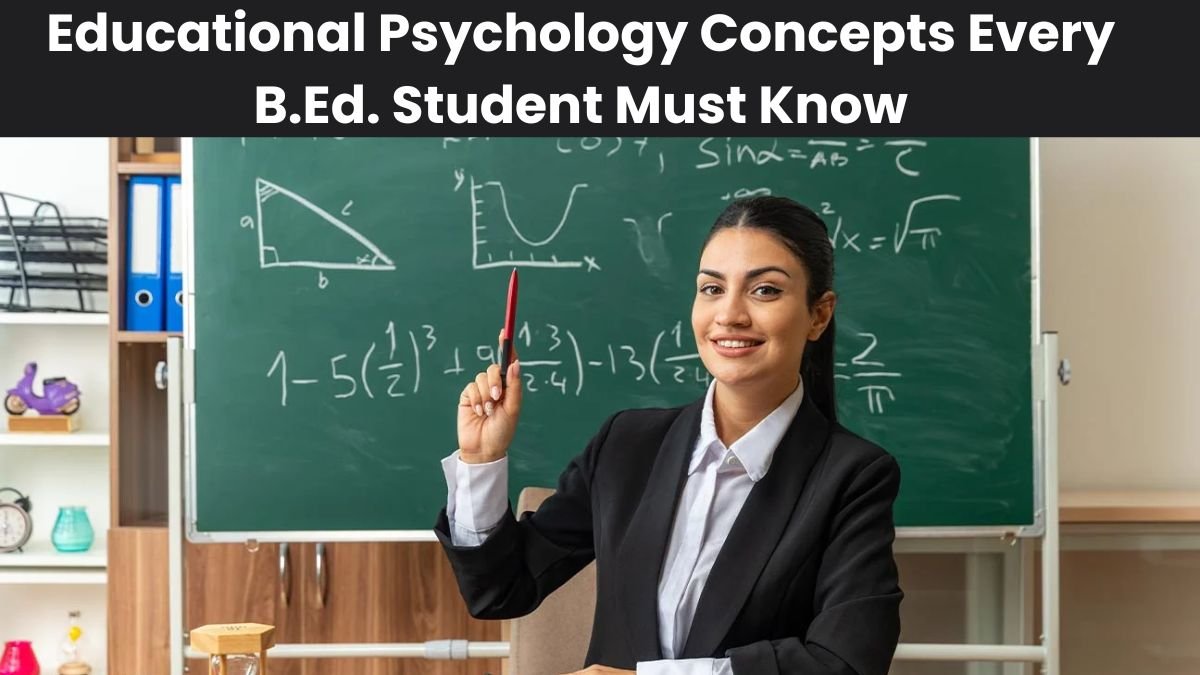Educational Psychology: Educational Psychology is a scientific method of understanding the deep relationship between teaching and learning. It is the branch of psychology that studies how people learn, how different age, culture, gender and socio-physical environment affect human learning. This subject is very important especially for B.Ed. students as it helps them to become a skilled, sensitive and effective teacher. Let us know in detail in this article the major principles, ideologies and practical utility of educational psychology.
What is Educational Psychology?
Educational psychology is the study that focuses on those factors that influence the learning process inside the classroom and outside it as well. It examines the way an infant learns new information, how he comprehends it, remembers and rehearses it. It links concepts of psychology and those of education, in a manner in which the curriculum development, instructional means and handling of the classroom can be made more effective.
Educational psychologists serve as liaisons between teachers, students, parents and school management so as to ensure that learning potential of the student is maximized.
Major learning theories
Behaviorism
Major thinkers: Edward Thorndike, Ivan Pavlov, John Watson, B.F. Skinner
This theory believes that learning occurs as a response to an external stimulus. If a behavior receives a positive outcome (such as reward), then that behavior is repeated again and again.
Main features:
- Learning is a direct behavioral change.
- Learning can be controlled through rewards and punishments.
- Teaching students by dividing them into small goals.
Example: If the child gets praise or reward for doing homework, then he will do the homework on time in future as well.
Cognitivism
Important theorists: Jean Piaget, Jerome Bruner, Robert Gagne
This theory dwells on reception, organization and utilization of information by the child. It feels that the child is very much thinking being and learns new information depending on what he/she already knows.
Key features:
- Emphasis on attention, motivation, memory and problem solving.
- Learning is the result of mental processes.
- Personalizing the lesson.
Example: requires the students to write a summary of a lesson that limb they have read so that they are able to grasp them in their own words.
Constructivism
Major theorists: Jeans Piaget, Lev Vygotsky, John Dewey
As this theory goes, learning is an active process whereby the student develops knowledge on his own. The teacher just acts as a guide.
Key features:
- Learning based on the prior knowledge of the students.
- Problem-based learning and discovery-based learning.
- Group work, discussion and collaborative environment.
Example: Making students discover rules by conducting experiments in science class.
Experientialism
Key thinkers: David Kolb, Carl Rogers
This theory believes that the best learning happens through real-life experiences.
Key features:
- Project-based learning
- Internships, field trips, role-play and experimental work
- Active participation of students in the learning process
Example: Making B.Ed. trainees do teaching practice in school.
Social Contextual Theory
Key thinkers: Albert Bandura, Lev Vygotsky, Etienne Wenger
This theory says that learning takes place not only in the individual but also in the social and cultural context. Students should be given opportunities to learn from their social environment and peers.
Key features:
- Modelling and imitation
- Group work and collective knowledge construction
- Encouragement of social interaction in the classroom
Examples: collaborative learning, group discussions, feedback from peers.
Significance for B.Ed. students
- Understanding these principles helps students understand different learning styles and diverse learning needs of children.
- Helps make classroom management, lesson planning and assessment more effective.
- It is easier to plan teaching keeping in mind the mental, social and moral development of students.
- These principles enable the teacher to play the role of a guide in the overall development of children rather than just a teacher.
Conclusion
Understanding educational psychology is extremely important for every B.Ed. student. This not only makes them an efficient teacher but also helps them understand the needs of children and provide them with a positive and motivating learning environment. With the knowledge of various psychological principles, teachers can improve their teaching skills and make children’s learning more interesting and effective.
This subject paves the way not only from the examination point of view but also towards becoming a true teacher. Therefore, it is equally important for B.Ed. students to not only study these principles of educational psychology but also put them into practice.
